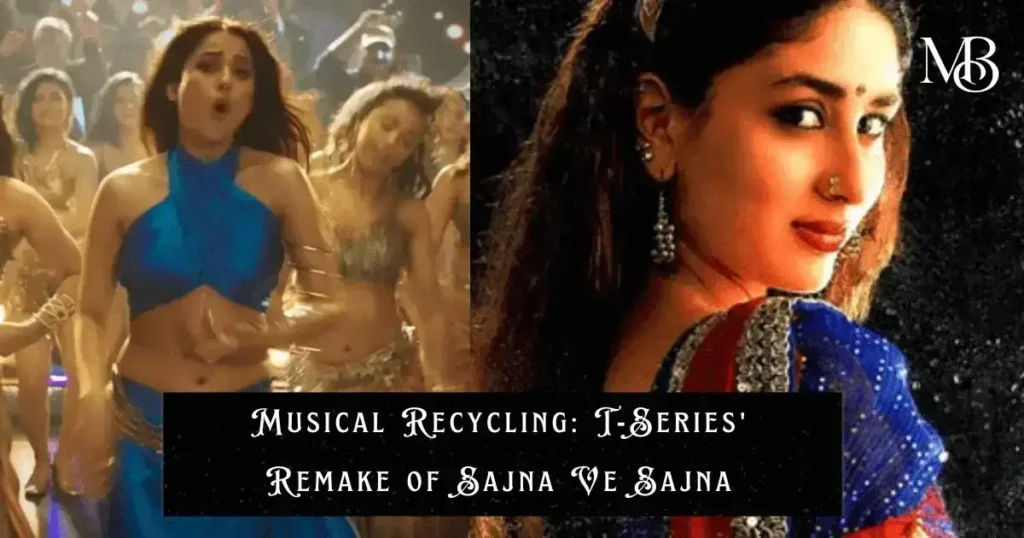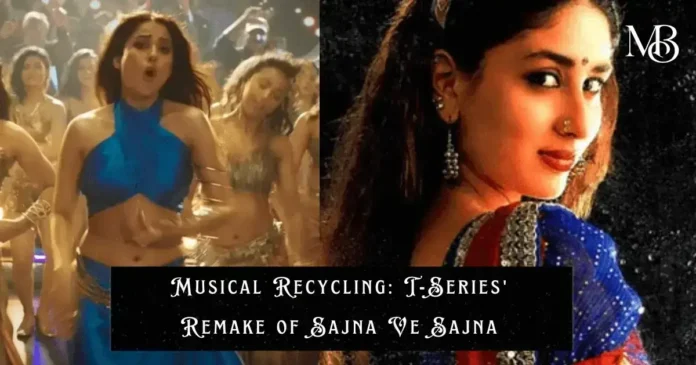In the ever-evolving world of music, especially in Bollywood, nostalgia often serves as a powerful tool to connect audiences across generations. Tapping into the memories of the past and bringing them into the present can sometimes be a winning formula. But what happens when a beloved classic is remade, repackaged, and, in the eyes of many, stripped of its essence? Enter the era of musical recycling, a trend championed by industry heavyweight T-Series, which has turned remaking Bollywood classics into its very own brand of nostalgia-fueled content.
One of the latest victims (or beneficiaries, depending on how you see it) of this trend is Sajna Ve Sajna, a beloved song from the 2004 film Chameli. Originally composed by Sandesh Shandilya and sung by the ever-soulful Sunidhi Chauhan, the song was a hauntingly beautiful expression of raw emotion. Its slow tempo and soft melody blended perfectly with Kareena Kapoor’s portrayal of a complex, emotionally charged character.

Fast forward to 2023, and T-Series decided it was time for a fresh coat of paint on this classic. The remake of Sajna Ve Sajna—complete with modern beats, EDM influences, and a glitzy music video—was born. But rather than being celebrated as a homage to the original, the remake was met with criticism, particularly from millennials. What happened here? Why was this remake less of a tribute and more of a disappointment for those who adored the original?
The Art of Remaking: Nostalgia or Commercialization?
T-Series has become synonymous with the remake culture in Bollywood. From Aankh Marey to Humma Humma, the brand has churned out one recycled hit after another, often to polarizing reception. These remakes are designed to appeal to both younger audiences unfamiliar with the originals and older generations who may appreciate the revival of a classic they once loved.
On the surface, this strategy makes sense. After all, music and pop culture are cyclical. But in the case of Sajna Ve Sajna, it wasn’t just a mere update of an old song—it was a complete overhaul. Gone were the soft undertones and emotional subtleties that made the original so powerful. In its place was a louder, more commercialized version that felt disconnected from the source material.
For many millennials, especially those who grew up with the original, this felt like a betrayal of sorts. The soulful, heart-wrenching track they had once connected to emotionally was now a glossy product of modern Bollywood’s remake machine.
Millennial Discontent: Why the Backlash?
Millennials, often referred to as the “nostalgic generation,” have a deep connection to the music of their formative years. When a song like Sajna Ve Sajna gets a modern makeover, it can feel as though the emotional depth of the original is being replaced by commercial interests. The remake culture, now often criticized as musical recycling, is seen by many as an attempt to cash in on tried-and-true hits rather than investing in new, innovative compositions.
Some of the key reasons for millennial dissatisfaction include
– Emotional Disconnect: The original Sajna Ve Sajna was a slow-burning, soulful melody that resonated with listeners on a deeply emotional level. The remake, with its upbeat tempo and modern production, lacked that same emotional depth, leaving fans feeling detached.
– Over-commercialization: The music industry today often focuses on producing content that can go viral. Remakes like Sajna Ve Sajna tend to cater to mass appeal, featuring flashy visuals and production, but sacrificing the authenticity and rawness of the original.
– Nostalgia Lost: For millennials, songs like Sajna Ve Sajna are more than just music—they represent a time in their lives filled with specific memories and emotions. When these songs are reworked in a way that strips them of their original identity, it can feel like a personal affront to their nostalgia.
The Industry’s Perspective: A Business Model That Works
For T-Series, however, the remake strategy has proven successful time and again. The YouTube views and streaming numbers don’t lie. Younger audiences, who may not be familiar with the originals, often appreciate these remakes for their catchy beats and modern production. The music videos, complete with stylish actors and high-budget visuals, are designed to capture attention in a world where content consumption is at an all-time high.
From a business standpoint, musical recycling makes perfect sense. It’s a way to reduce the risk of creating entirely new music while tapping into an existing fan base. The company has the data to back up the fact that these remakes bring in significant revenue and engagement. But the question remains: at what cost?
Is There Room for Balance?
The remake of Sajna Ve Sajna is just one example of how Bollywood’s remake culture is both a boon and a bane. While it allows older songs to be rediscovered by a new generation, it also risks alienating the very audience that made the original a hit in the first place.
There may, however, be a middle ground. Instead of remaking classics with a complete overhaul, what if we focused on creating respectful tributes that preserve the essence of the original while adding subtle modern elements? Recent remakes that have found a balance between nostalgia and innovation have been met with better reception, proving that it’s possible to update without erasing.
Where Does Bollywood Go From Here?
As Bollywood continues to grapple with its identity in an age of remakes, it’s clear that the trend of musical recycling is here to stay—at least for now. But if the backlash surrounding songs like Sajna Ve Sajna teaches us anything, it’s that audiences, particularly millennials, are hungry for more than just recycled hits. They want originality, depth, and music that resonates emotionally.
For now, T-Series’ remake factory continues to churn, but the growing chorus of discontent might just be the catalyst for a shift. Until then, millennials will keep revisiting their original playlists, where the classics remain untouched, unsullied, and emotionally intact.
You might also like: Musical Recycling: T-Series and the Art of Repurposing Nostalgia
Do you think the remake trend is here to stay? Or should Bollywood start focusing on original music again? Share your thoughts in the comments! If you liked our “Musical Recycling” then visit Odyssey page for more such articles


